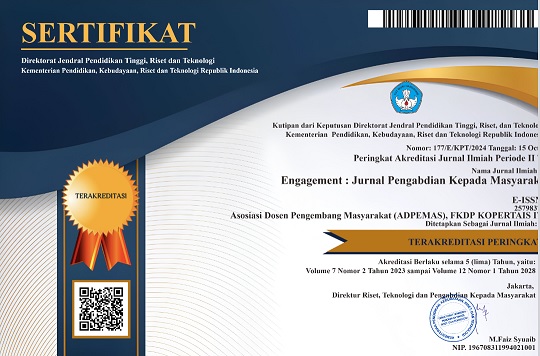"Obah" Business Assistance for Productivity of People With Mental Disorders (ODGJ) Through Economic Token Motivation and Online Marketing
Abstract
Decreased productivity and quality of life experienced by People with Mental Disorders (ODGJ) are caused by decreased cognitive, personal and social functions which will affect their ability to work and be productive. ODGJ lose their job and find it difficult to find a job. Omah Barokah (OBAH) is a business established to provide opportunities for ODGJ to work and be productive. OBAH has been running for 2 years and needs assistance to increase employee motivation, expand marketing and financial management. This service activity aims to improve the quality of OBAH, which is a food business located in Kembaran Hamlet, Tamantirto, Kasihan, Bantul. Participants are 8 employees and 2 managers. The service team compiled a module for improving the OBAH business. The activity was carried out for 1 month in the form of providing motivation to work through online videos for 3 meetings. Online marketing assistance through website creation. Program results are measured by increasing employee motivation and improving the quality of online marketing. The results of the training will continue to be carried out by the manager so that the OBAH business continues to grow.
Downloads
References
Anafarhanah, Sri. “Keutamaan Bekerja (Berproduksi) Dalam Islam.” Alhadharah 15, no. 30 (2017): 1.
Anshori, Cecep Sudirman. “Ukhuwah Islamiyah Sebagai Fondasi Terwujudnya Organisasi Yang Mandiri Dan Profesional.” Jurnal Pendidikan Agama Islam 14, no. 1 (2016): 117–125. http://jurnal.upi.edu/file/08_Ukhuwah_Islamiyah_-_Sudirman.pdf.
Bond, G. R., and R. E. Drake. “New Directions for Psychiatric Rehabilitation in the USA.” Epidemiology and Psychiatric Sciences 26, no. 3 (2017): 223–227.
Chowdhury, Tanaya Roy, Kamlesh Kumar Sahu, and Parthasarathy Biswas. “Disability and Rehabilitation Needs of Persons with Schizophrenia.” Indian Journal of Psychiatric Social Work 9, no. 1 (2018): 38–46.
Cyhlarova, E., McCulloch, A., McGuffin, P., & Wykes, T. Economic Burden of Mental Illness Cannot Be Tackled without Research Investment. London: : Mental Health Foundation, 2010.
Delavega, Lydia, and Emma Tampubolon. “Management Journal.” Fundamental Management Journal 3, no. 1 (2018): 65–72.
Farid Poniman, Indrawan Nugroho, dan Jamil Azzain. Kubik Leadership. Jakarta: Penerbit PT Gramedia Pustaka Utama, 2005.
Ganguly, Pronab, Abdrabo Soliman, and Ahmed A. Moustafa. “Holistic Management of Schizophrenia Symptoms Using Pharmacological and Non-Pharmacological Treatment.” Frontiers in Public Health 6, no. June (2018).
Hamdi, L. F., Wardaningsih, S., & Puspitosari, W. A. (2021, January). E-emsy Development in the Implementation of Psychiatric Emergency Training for Nurses and Doctors. In 4th International Conference on Sustainable Innovation 2020–Health Science and Nursing (ICoSIHSN 2020) (pp. 590-603). Atlantis Press.
Karisma, Yana, Susanto, Eri Sasmita, and Lilis Hartina. “Rancang Bangun Sistem Informasi Penjualan Kain Tenun (KRE Alang) Berbasis Web.” Jurnal Informatika Teknologi dan Sains 2, no. 3 (2020): 152–158.
Kim, Doeyoon. “Current State of Vocational Rehabilitation Program for Individuals with Disabling Mental Illness in Korea.” Korean Journal of Psychosomatic Medicine 25, no. 2 (2017): 145–152.
Lak, Davis C.C., Hector W.H. Tsang, Alex Kopelowicz, and Robert P. Liberman. “Outcomes of the Chinese Basic Conversation Skill Module (CBCSM) for People with Schizophrenia Having Mild to Moderate Symptoms and Dysfunction in Hong Kong.” International Journal of Psychiatry in Clinical Practice 14, no. 2 (2010): 137–144.
Lieberman, J.A., Stroup, T.S., Perkins, D.O. The American Psychiatric Publishing Textbook of Schizophrenia, 1st Ed. Washington, DC.: American Psychiatric Pub, 2006.
McDaid, David, Martin Knapp, and Shoba Raja. “Barriers in the Mind: Promoting an Economic Case for Mental Health in Low- and Middle-Income Countries.” World Psychiatry 7, no. 2 (2008): 79–86.
Raeanne C. Moore, Donald J. Viglione, Irwin S. Rosenfarb, Thomas L. Patterson, and Brent T. Mausbach. “Rorschach Measures of Cognition Relate to Everyday and Social Functioning in Schizophrenia.” Psychol Assess. 25, no. 1 (2013): 253–263.
Thornicroft, Graham, Elaine Brohan, Diana Rose, Norman Sartorius, and Morven Leese. “Global Pattern of Experienced and Anticipated Discrimination against People with Schizophrenia: A Cross-Sectional Survey.” The Lancet 373, no. 9661 (2009): 408–415. http://dx.doi.org/10.1016/S0140-6736(08)61817-6.
Whiteford, Harvey A., Louisa Degenhardt, Jürgen Rehm, Amanda J. Baxter, Alize J. Ferrari, Holly E. Erskine, Fiona J. Charlson, et al. “Global Burden of Disease Attributable to Mental and Substance Use Disorders: Findings from the Global Burden of Disease Study 2010.” The Lancet 382, no. 9904 (2013): 1575–1586.
Copyright (c) 2021 Engagement: Jurnal Pengabdian Kepada Masyarakat

This work is licensed under a Creative Commons Attribution-ShareAlike 4.0 International License.






.png)




